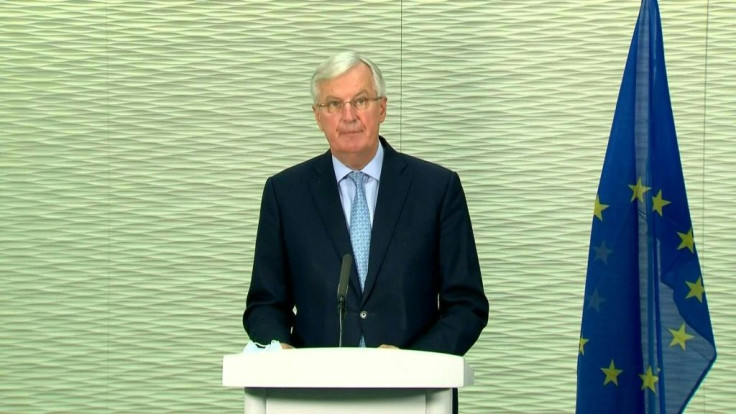Brexit News: Chances Of UK-EU Trade Deal Diminishing As New Round Of Talks Start Monday

KEY POINTS
- Talks between U.K. and EU trade representatives have stalled over a number of issues
- Johnson’s senior ministers will not relinquish their desire to maintain full autonomy with respect to government aid
- There is a risk of a no-deal scenario at the end of the year, an EU official warned.
As the deadline for a deal with the European Union swiftly approaches, some top members of British Prime Minister Boris Johnson’s administration predict just a 30%-40% chance of a Brexit trade agreement.
Talks between U.K. and EU trade representatives have stalled over a number of issues, with the next round slated to commence in London on Monday.
Among other things, the Times reported, the U.K.’s insistence on using state aid to upgrade its technology sector meant that Johnson’s senior ministers will not relinquish their desire to maintain full autonomy with respect to government aid – in defiance of Brussel’s wishes.
“Inside No 10, they now think there is only a 30% to 40% chance that there will be an agreement,” James Forsyth, political editor of The Spectator, wrote.
In the event that trade deal is not ironed out by the Dec. 31 deadline – a date Johnson refuses to extend -- the relationship between London and Brussels would revert to terms mandated by the World Trade Organization – which would involve various tariffs.
“There is a risk of a no-deal scenario at the end of the year,” an EU official said, Reuters reported. “People need to be ready for that.”
In a recent research report, the Dutch bank Rabobank warned: “ Given the little amount of time available and the divergent strategies of both sides, the scope of the [trade] agreement remains limited. Such a limited agreement will have negative ramifications for the U.K. economy and, to a lesser extent, the EU economies that have a close economic relationship with the U.K.”
Ultimately, Rabobank noted, the talks will boil down to the “trade-off between regulatory autonomy and the ability to have deep international trading relationships. Since this U.K. government puts sovereignty at the center of how it sees Brexit, the scope for any agreement remains very limited.”
Some U.K. government ministers are maintaining a defiant attitude.
Britain's Secretary of State for Transport Grant Shapps said he was “absolutely confident” that the U.K.’s supply chains will operate smoothly regardless of what occurs with the EU talks.
“We’ve kept the supply chains going [during the pandemic] and I’m absolutely confident we’ll do that again in the future going forward,” Shapps told BBC radio.
The U.K. government has also been criticized – within Britain itself – for its secrecy in relation to its trade negotiations with the EU and for its alleged failure to grasp the magnitude of these talks.
The National Audit Office, an independent parliamentary body, said the Department for Exiting the European Union, the government agency that was tasked with overseeing Brexit negotiations, “kept a tight hold on communications, keeping secret anything which might pertain to the U.K.’s negotiating position. This instinct for secrecy in government can get in the way of effective coordination, collaboration and a sense of urgency in progressing towards a common goal.”
Other government arms – including the Department for Environment, Food and Rural Affairs and the Department for Transport -- requested third parties to sign non-disclosure agreements related to Brexit matters.
“The non-disclosure agreements undermined transparency and hampered the spread of information to the business community at large,” the NAO said.
Gareth Davies, the head of the NAO, stated: “Preparing for EU exit continues to be a highly complex and challenging task for government and stakeholders. Government can draw on this learning in preparing for the end of the transition period and beyond, and in managing other cross-government challenges.”
Meanwhile, senior EU trade officials continue to implore the U.K. to find a compromise in order to break the stalemate in the ongoing talks.
EU chief negotiator Michel Barnier told the Institute of International and European Affairs, an Irish think tank, on Wednesday, that his British counterparts have refused to budge on any talking points, including the conflict over state aid, fishing rights and Britain’s insistence on establishing its own rules on trade regulations.
"It's normal that the U.K. wants to set its own standard and rules. But if these serve to distort competition with us, then we have a problem,” said Barnier. "The U.K. government is still looking to keep the benefits of the EU and of the single market without the obligation.”
Barnier added: "We will not sacrifice — never sacrifice — the EU's long-term economic and political interests for the sole benefit of the U.K. In past months, the EU has repeatedly shown flexibility and creativity to work with the U.K.”
© Copyright IBTimes 2025. All rights reserved.





















